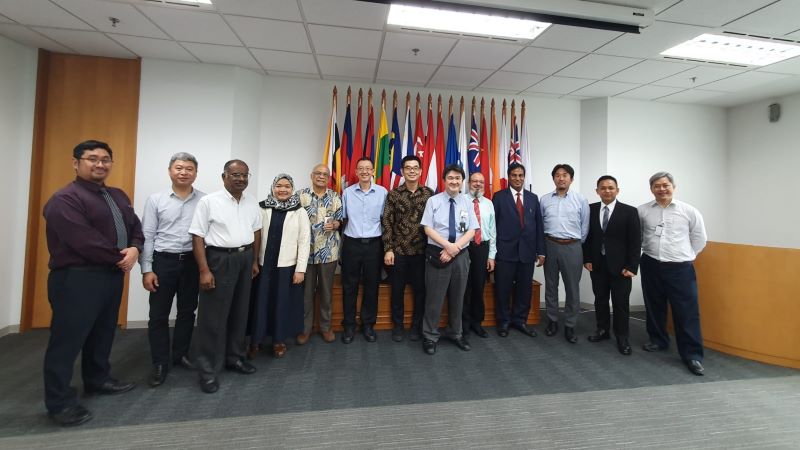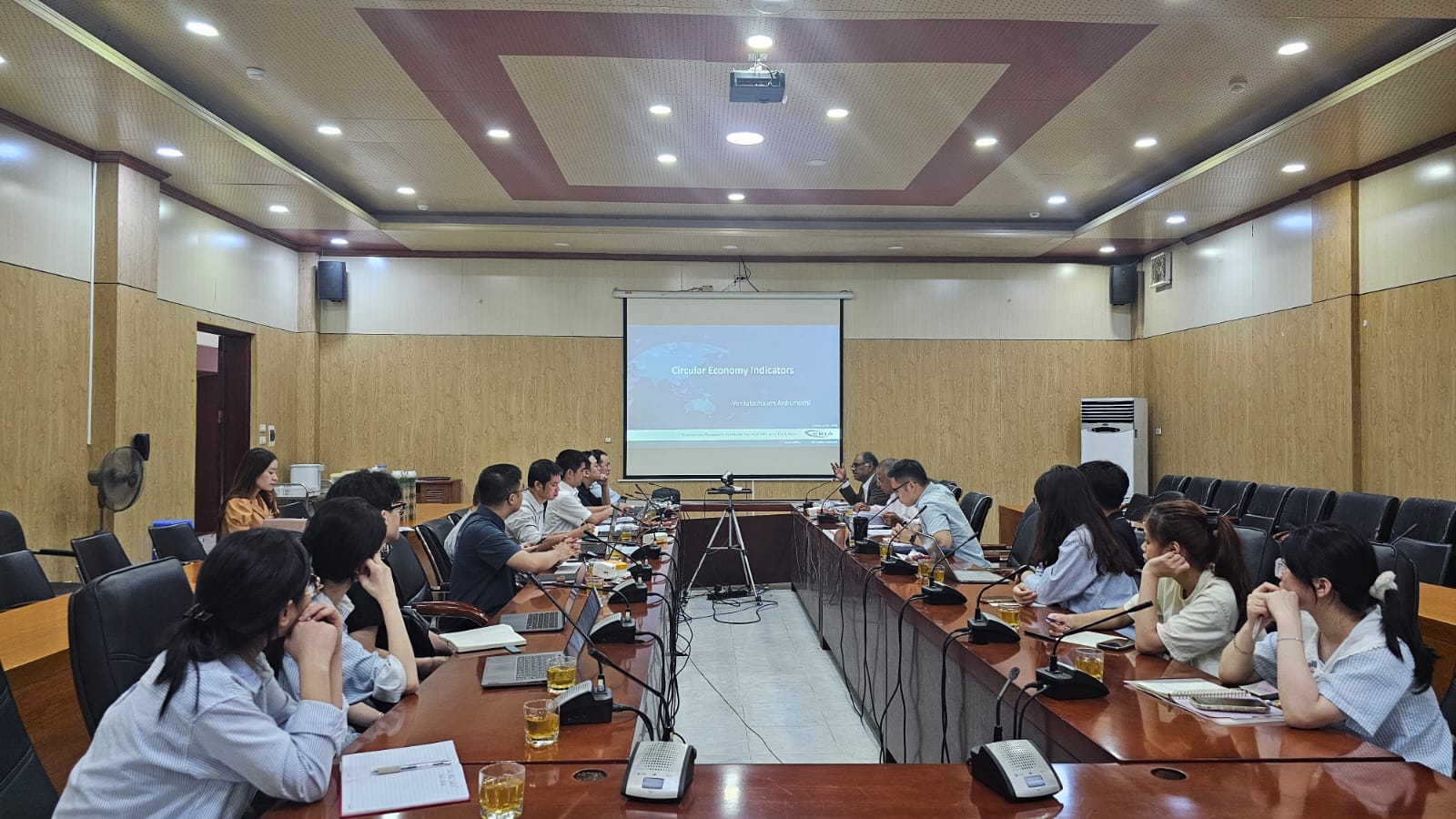ERIA Working Group Advances Future Mobility Fuel Scenarios in East Asia Summit Countries
Date:
26 April 2023Category:
NewsTopics:
Energy, Working GroupShare Article:
Print Article:
Jakarta, 26 April 2023: The ERIA Working Group (WG) on Analysis of Future Mobility Fuel Scenarios Considering the Sustainable Use of Biofuels and Other Alternative Vehicle Fuels in East Asia Summit (EAS) Countries held its second meeting at the ERIA Annex Office. The WG focused on additional measures to achieve targeted electric vehicles (EVs) in terms of price, equipment, taxation system, and others whilst synergising with biofuel vehicles feedstock, equipment, and technology. The meeting aimed to report progress on ongoing research and streamline findings to meet the project’s 3-year objectives.
The meeting was attended by nine of the ten members of WG 2022–2023. The ten members of WG 2022–2023 are Dr Shinichirou Morimoto (WG Leader), Environmental and Social Impact Assessment Team, Global Zero Emission Research Center (GZR), National Institute of Advanced Industrial Science and Technology (AIST), Japan; Prof Shabbir H. Gheewala (WG Sub-Leader), Professor and Head, Life Cycle Sustainability Assessment Lab, Joint Graduate School of Energy and Environment, King Mongkut’s University of Technology Thonburi, Thailand; Dr Nuwong Chollacoop (WG Sub-leader), Director, Low Carbon Energy Research Group, National Energy Technology Center, Thailand; Dr Bhupendra Kumar Singh, Former Adviser, Energy Security Ministry of External Affairs, India; Dr Tatang H. Soerawidjaja, Bandung Institute of Technology, Indonesia; Dr Adhika Widyaparaga, Assistant Professor, Centre for Energy Studies, Universitas Gadjah Mada, Indonesia; Dr Yuki Kudoh, Deputy Director, GZR-AIST; Dr Harrison Lau Lik Nang, Leader, Biofuel Technology Group, Malaysian Palm Oil Board; Dr Pham Huu Tuyen, Director, Research Center for Engines, Hanoi University of Science and Technology, Viet Nam; and Ms Ruby B. De Guzman, Assistant Director, Renewable Energy Management Bureau, Department of Energy, Philippines.
Other experts who attended the meeting as observers were Dr Venkatachalam Anbumozhi, Director of Research Strategy and Innovation, ERIA; Ms Ayu Pratiwi Muyasyaroh, Research Associate, Energy Unit, ERIA; and Ms Rika Safrina, Energy Modelling and Policy Planning Officer, ASEAN Centre for Energy.
Also attending as representatives of their institutions were Dr Peerawat Saisirirat, Researcher, National Energy Technology Center, National Science and Technology Development Agency, Thailand; Ms Shairah Wahidah Mariño, Science Research Specialist II, Biomass Energy Management Division, Department of Energy, Philippines; and Mr Rendi Ahmad Rustandi, GZR-AIST.
Opening the meeting, Dr Morimoto invited the WG members to revisit the goals of the project and work for the project’s third year by taking stock of its first 2 years.
Dr Anbumozhi, in his opening statement, stated the importance of the WG meeting in progressively pushing the adoption of EVs, along with biofuel, in EAS countries. He said such an integrated effort will significantly reduce greenhouse gas (GHG) emissions in the transport sector of EAS countries. He added that electrifying vehicles in EAS countries will help them address their air pollution problems.
The WG members presented the following topics: the impediments to achieving the EV aims, as well as the unintended consequences of EV implementation, and how the barriers can be addressed.
Mr Rustandi delineated the well-to-wheel GHG emissions and mineral resource demand for vehicle electrification in EAS countries based on three scenarios: business as usual, electric vehicles, and biofuels. He said that, in general, EVs can reduce GHG emissions more than biofuels can due to the latter's use of internal combustion engines. He added that in terms of mineral resources, it was forecast that the supply of cobalt and neodymium would not meet demand until 2040.
Dr Morimoto said that EVs have a lot of potential for lowering carbon dioxide emissions. He added, however, that such potential may be hampered by supply–demand issues in the mineral resources sector. Dr Morimoto asked the WG members if EV targets can be met, what options can be proposed, and what the WG should do if the EV targets are not met.
In response, Dr Soerawidjaja stated that Indonesia aims to achieve 25% and 30% of EV fleet shares of cars and motorcycles, respectively, by 2035. He said that despite the Indonesian government's present initiatives to achieve these targets, barriers to the country's EV development remain, such as high prices of EVs and a lack of charging infrastructure.
Dr Widyaparaga explained the status of and measures for EV introduction in Indonesia. In support of the Indonesian Vehicle Electrification Policy, he explained that the government has enacted legislation mostly concerning monetary and non-monetary incentives, charging stations, and vehicle conversion. He said government financial incentives can drastically lower the cost of EVs. He reported that based on recent sales data, most Indonesians prefer higher-end EV cars due to battery concerns.
Dr Nang discussed Malaysia’s biofuel and EV development and indicated the country’s intent to meet the B30 (biodiesel containing 30% of palm oil-based fuel) target by 2030. He shared Malaysia’s new plan for big vehicles that use B100. He said pricing, talent development, and charging point distribution remain some of the country's challenges to the development of EV infrastructure.
Prof Tuyen, describing the status of EVs in Viet Nam, stated that most components of electric two-wheelers are imported and assembled locally. He reported that a private entity dominates the EV industry in Viet Nam and that battery plants where customers can cheaply rent batteries monthly are being constructed. Prof Tuyen mentioned some barriers to EV development in Viet Nam such as policy implementation, infrastructure, technical expertise, and the market.
Dr Chollacoop informed the participants that 2022 was a golden year for EVs, especially for battery electric vehicles (BEVs), in Thailand, where the number of BEVs increased significantly due to reduction of excise tax. He indicated some barriers to EV development in the country such as high insurance cost for EVs and their low resale price, and lack of skilled workforce.
Prof Gheewala emphasised the importance of considering the damage to health and the environment from the entire lifecycle of EVs. He explained that in reducing EV waste, the products generated from recycling may not be needed in the future.
Dr Singh disclosed that EVs in India are expected to grow at 49% from 2022 to 2030. He said, however, that challenges persist, including sporadic policy, lack of trained professionals, and shortage of raw material. Dr Singh concluded by recommending ways to tackle the challenges, such as accelerating professional training and enacting common federal regulations on EVs.
Ms Mariño outlined the current state of EV and charging stations, manufacturing, research and development, and human resource development components of the EV business in the Philippines. She said that the Electric Vehicle Industry Development Act was enacted in 2022 to achieve the government’s target of 10% EV share by 2040. She added that a comprehensive roadmap of the EV industry in the country is being finalised.
The participants shared insights on the key narratives needed to promote synergistic relations between biofuels and EVs and the net beneficial effects of promoting EVs, considering the high cost of initial investment in countries with high GHG emissions. The discussions identified the drivers and determinants of EAS mobility scenarios to be included in the final report. The first draft of the report is expected by the end of May 2023.

.jpg)
.jpg)







